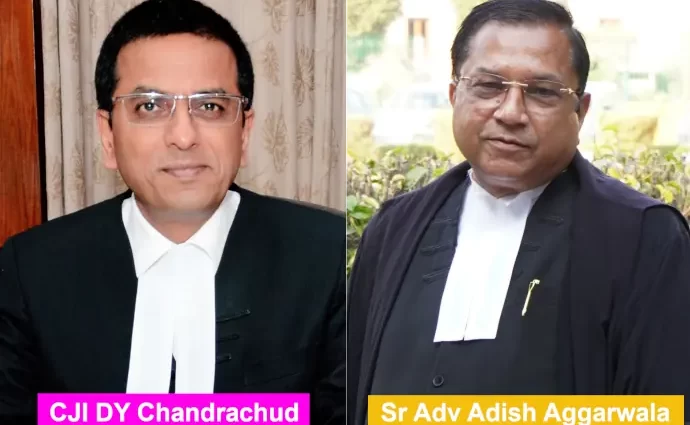In an unprecedented display of belligerence by the Chief Justice of India (CJI) DY Chandrachud, when hearing the ongoing spillover from the Court’s judgement on Electoral Bonds on February 15, he rebuked Supreme Court Bar Association (SCBA) President and Senior Advocate Adish Aggarwala who had sent the CJI a letter requesting him to take suo motu review of the Electoral Bonds judgment.
The CJI, who had surprised the high and mighty of the Indian judiciary with the judgement delivered by the five-judge bench headed by the CJI was hearing various petition filed seeking to alter the verdict.
“Apart from being a senior counsel, you are president of SCBA. You have written a letter asking me to invoke my suo motu powers. These are all publicity related, we will not get into this. Do not make me say anything more. Mr Aggarwala, please keep it at that. Otherwise, I may have to say something more which may be a little distasteful,” the CJI said when Aggarwala sought to mention his letter before the bench.
The five-judge Bench of CJI Chandrachud and Justices Sanjiv Khanna, BR Gavai, JB Pardiwala and Manoj Misra was hearing the case relating to electoral bonds, specifically on directions issued to the State Bank of India (SBI) to disclose details of bonds including the bonds’ numbers.
On February 15, the Supreme Court had unanimously quashed the Electoral Bonds Scheme and directed the State Bank of India (SBI) to submit the details of the political parties that have received contributions through electoral bonds from April 12, 2019, to the ECI.
On behalf of the tens of thousands of the aggrieved donors under the scheme which was validly legislated and launched in 2017, Senior Counsel Aggarwala, on March 12, had first written to the President of India, claiming that the Supreme Court decision in the case was wrong and the President should withhold the judgment and seek a presidential reference under Article 143 of the Constitution of India in the matter.
Thereafter, on March 14, Aggarwala wrote another letter, this time in his personal capacity, to the CJI seeking suo motu review of the electoral bonds judgment.
In another similar heated exchange, the Chief Justice of India D.Y. Chandrachud scolded senior advocate Mathews J. Nedumpara after a tense moment during a hearing on electoral bonds. Senior advocate Nedumpara was disputing the Supreme Court’s decision, claiming that the entire ruling on electoral bonds was made without the public’s knowledge. “This was a policy matter and not for the courts to get into. That is why people feel this judgment was given behind their back,” he argued.
This agitated the bench.
“Don’t shout at me,” CJI said, stating, “This is not a Hyde Park corner meeting, you are in the court.”
“If you want to make an application, submit one. You have my decision as Chief Justice, we won’t hear you. If you wish to submit an application, do so via email. That’s the protocol in this court,” the CJI added.
The belligerence exhibited by the CJI is exemplary. It is almost as if the bench is aware the fragility of the footing of their decision.
Also read: To same Sex Marriage, India’s Supreme Court says NO
In my view, the decision of the five-judges bench is legally imperfect as it declared a validly legislated scheme of the government, which had promised privacy and in some sense anonymity to the millions of donors, who were asked to ‘bank (document) their money, before they could donate to political parties’.
Those donors, who relied on the government’s promise of privacy and anonymity, were not heard by the court.
At times, the government has used similar (not identical) methods to “unblack, black money from the country”. One such scheme was Income Declaration Scheme of 2016. Just between 1 June 2016 and 30 September 2016, 71, 726 people holding black money made those declarations – unearthing Rs 67,382 crores for which the government more than Rs 12, 700 crore.
Clearly, such schemes have worked wonders for the nation. Those who had hoarded black money, after paying the tax and miniscule penalty, managed to convert that money into white money.
And they were happy and remained anonymous.
Did the Supreme Court of India jump in then – to ordain that under Article 14 of the Constitution, the people of India had a right to know who these people were?
The answer is NO.
Will people of India be able to trust the governments in future with their legislative framework offerings and the promises made through them?
Only time will tell.
Similar Posts by The Author:
- VHP Australia brings Hindus together to work toward ‘growing and thriving Australia’
- The Untold story of the ANZAC-India friendship
- Australia Post – new performance standards from 15 April
- Premier’s department fighting the release of SECRET hotel quarantine documents
- Vic Gov funds 13 programs that help international Students

